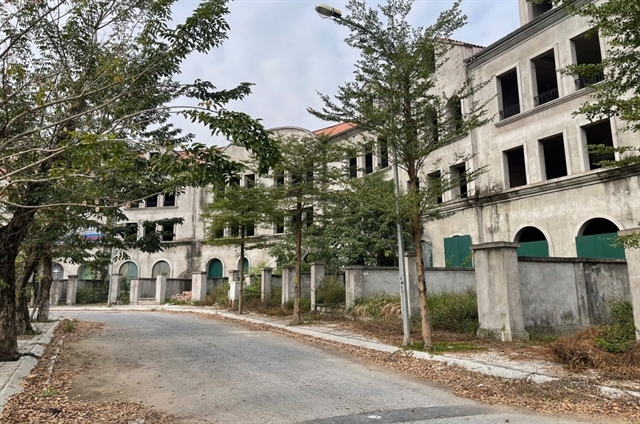 Society
Society

 |
| A row of abandoned townhouses in Hoài Đức Commune, Hà Nội. — VOV Photo |
HÀ NỘI — Property prices have been on the rise, causing economists and industry insiders to support stronger tax measures to keep prices in check while urging caution in their implementation.
Last week, the Vietnam Association of Real Estate Brokers (VARS) called for additional taxes on second properties and unused land lots, especially on apartments. According to the association, apartment prices in the second quarter increased by nearly 60 per cent in Hà Nội and 27 per cent in HCM City, compared to 2019.
In addition, mid-range products have largely disappeared with over 80 per cent of new apartments priced at VND50 million or US$2,000 per square metre (sqm) or higher. In some extreme cases, new apartments were listed for tens of thousands of dollars per sqm.
Older apartments experienced a price surge with decades-old units listed at two and three times their original prices. Price increases for villas, townhouses and suburban lands, while less outrageous, have also been reported.
Industry insiders attributed recent price surges to market speculators and manipulators having painstakingly created artificial supply-demand imbalances for profit.
Nguyễn Văn Đỉnh, the association’s chairman, said Việt Nam currently lacked a legal framework to monitor and prevent speculative activities and land hoarding, both of which were major contributing factors to price hikes. It has been common for speculators to purchase lands, only to leave them vacant for years, even decades, creating sporadic and isolated supply shortages to drive prices up.
“We identify the lack of deterrents against speculative activities and land hoarding as an urgent problem that must be addressed, despite the numerous foreseeable difficulties,” he said.
Economists said Việt Nam should learn from policies implemented by its Southeast Asian neighbours to curb land hoarding and speculation, including imposing heavy taxes on properties based on the duration of holding and if the properties were undeveloped.
For example, Singapore imposes a 16 per cent tax on properties purchased and sold within the last 12 months. The tax rate decreases to 12 per cent in the second year and 8 per cent in the third year. Selling the properties after 36 months from the date of purchase will be free of tax. Meanwhile, taxes in the island nation go up to 20 per cent and 30 per cent for the second and third properties, respectively.
Buyers who fail to develop their lands should also be subject to a 5 per cent tax, which would increase in subsequent years if the land remains undeveloped, a model employed by the South Korea government.
In France, vacant properties face a 17 per cent tax during the first year and double to 34 per cent in the next year. Such taxes should force owners of vacant lands and properties to rent or sell, boosting market supply.
This is the second round for second-property tax, which was discussed back in 2017 but later dismissed out of concerns for its feasibility and timing. Since then, the Ministry of Finance has been working on a series of policy changes to the country’s Property Law to improve land utilisation.
Implementation will likely face numerous obstacles, said economist Đinh Trọng Thịnh. He highlighted the need for a comprehensive and transparent database to track owners’ holdings. He also warned the government of legal loopholes that could allow owners to circumvent the laws through proxies and emphasised the risk of overtaxing, which could burden businesses and consumers.
“Every policy must ensure its gains will likely outweigh its damage,” he added.
Economist Đinh Thế Hiển from the Institute of Information and Business Research said a tax on second properties could hurt the market’s confidence, drive prices up and lead to market contraction.
“Taxes are double-edged swords that can either stimulate or hinder growth," he said.
"In principle, taxes should promote market transparency and growth, which can also be accomplished by starting a comprehensive land database and evaluation."
Taxes and regulations do not always effectively counter land hoarding and speculation. For example, strict rules in purchasing second properties in large cities such as Beijing and Shanghai have significantly put a damper on the market, with some experts saying the financial losses have been crippling: a $18 trillion decrease in household wealth, 18 million jobs lost and plummeting demand for construction materials. The rules have since been relaxed, allowing easier purchases of second properties.
Hiển said Việt Nam, with limited resources compared to China, must tread the water with extreme caution, as a rash decision could send the property market, a major driver of socio-economic growth, into a downward spiral, hurting the economy as a whole. VNS




